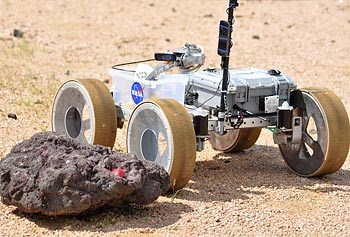Teams Score Impressive Wins in National, Regional Competitions

12/03/2013
By Edwin L. Aguirre
Sports performance requires talent, agility, stamina and, of course, brawn. And there’s no shortage of these qualities in UMass Lowell athletes, as evidenced by the University’s River Hawks hockey earning a trip to the Frozen Four and athletics jumping to Division I this year.
But there is also an arena where UMass Lowell students are tested in ingenuity and intellectual prowess, and they are doing an equally outstanding job in these “brain sports,” with impressive wins in national and regional competitions. These contests offer undergraduate and graduate students unique opportunities for experiential learning, team building and networking with peers, industry and academia.
Here are just a few examples of UMass Lowell students’ recent achievements in brain sports:
- A UMass Lowell robotics team called the “Rover Hawks” beat seven other teams from nine universities from across the country to take home the top prize at this year’s RASC-AL Exploration Robo-Ops Competition sponsored by NASA. The contest challenged the teams to demonstrate the capabilities of their student-built rovers in a Mars-like environment at the Johnson Space Center in Houston. The Rover Hawks’ rover was driven and controlled remotely from UMass Lowell’s New England Robotics Validation and Experimentation (NERVE) Center, the only robotics-testing facility in the region.
- UMass Lowell’s concrete canoe and steel bridge teams won first and third place, respectively, at this year’s regional competitions organized by the New England student chapter of the American Society of Civil Engineers (ASCE). The canoe team’s entry, designed and built using a specially formulated lightweight concrete mix reinforced with fiberglass mesh, beat perennial powerhouse Laval University from Quebec City for the top spot. The team advanced to the national competition in Illinois, finishing sixth against 22 other collegiate teams from across the United States, Canada and Puerto Rico. The bridge team’s 16-foot-long steel girder structure, which came in third overall in the regionals behind MIT and Laval University, ranked 14th out of 49 entries in the national competition held in Seattle.
- A group of UMass Lowell undergraduate students in computer science and nutritional science beat 10 other teams of programmers, or “hackers,” to win the top honor at the first U.S. Department of Defense mobile app “hackathon,” organized by the U.S. Army Natick Soldier Research, Development and Engineering Center. The group won by creating an app that will enable soldiers in the field to better understand and manage their combat nutrition requirements based on their Meals Ready to Eat, or MREs, as well as the total weight of their combat gear and their planned activity. The goal is to increase the combat effectiveness of the troops, ultimately allowing them to outperform any adversary.
- “BioBot,” a low-cost, mobile germ-detecting robot built by a team of electrical engineering students, was chosen among 30 entries from 18 institutions to win the “People’s Choice Award” category at this year’s Cornell Cup USA competition, presented jointly by Intel and Cornell University. The students designed Biobot to automatically take air samples in a room, such as a hospital ward, nursing home or daycare center, and then analyze the samples to quickly detect any harmful bacteria or viruses present. BioBot represents an international collaboration between the UMass Lowell team and biomedical engineering students from the Padmasri Dr. B. V. Raju Institute of Technology in Vishnupur, India.
- A team of plastics engineering and mechanical engineering students called Nonspec was awarded the grand prize for its innovative prosthetics project during the International Association of Plastics Distribution (IAPD) “Plastics Application Design Competition” held in October in Miami. The team beats Harvard School of Design by a wide margin. Nonspec’s goal is to develop low-cost replacement limbs for children in developing countries. The team was recently named one of the top 10 semi-finalists in Entrepreneur Magazine’s “College Entrepreneur of 2013 Contest.” It also won the title of “Campus-Wide DifferenceMaker” at this year’s first annual UMass Lowell DifferenceMaker Idea Challenge. This prize represents the project most likely to make a significant difference in the community, region and the world.
- A group of UMass Lowell plastics engineering and chemistry students is among seven teams from six colleges and universities across the country that won the prestigious “P3” — People, Prosperity and the Planet — award from the U.S. Environmental Protection Agency (EPA). The teams were recognized for their work in designing environmental solutions that will help improve quality of life, promote economic development and protect the environment. Each team receives up to $90,000 to further develop their designs and ideally bring them into the marketplace. UMass Lowell won the funding for creating safer, effective, non-toxic and biodegradable surfactants from abundant, renewable resources — namely, fruit-peel waste and sea algae.
- Mechanical engineering seniors Jia Wang, Jils George, Moustafa Ragab and Annu Kuriakose, advised by plastics engineering Asst. Prof. Stephen Johnston, won first place for their innovative custom-fit knee brace in the 2013 Design for Direct Digital Manufacturing Competition, sponsored by the Society of Manufacturing Engineers. The knee brace is designed to protect children 12 and younger from reinjuring their anterior cruciate ligament (ACL) after reconstructive surgery. Orthopedic specialists estimate that approximately 10,000 children tear their ACLs annually, and the number increases with each passing year.
